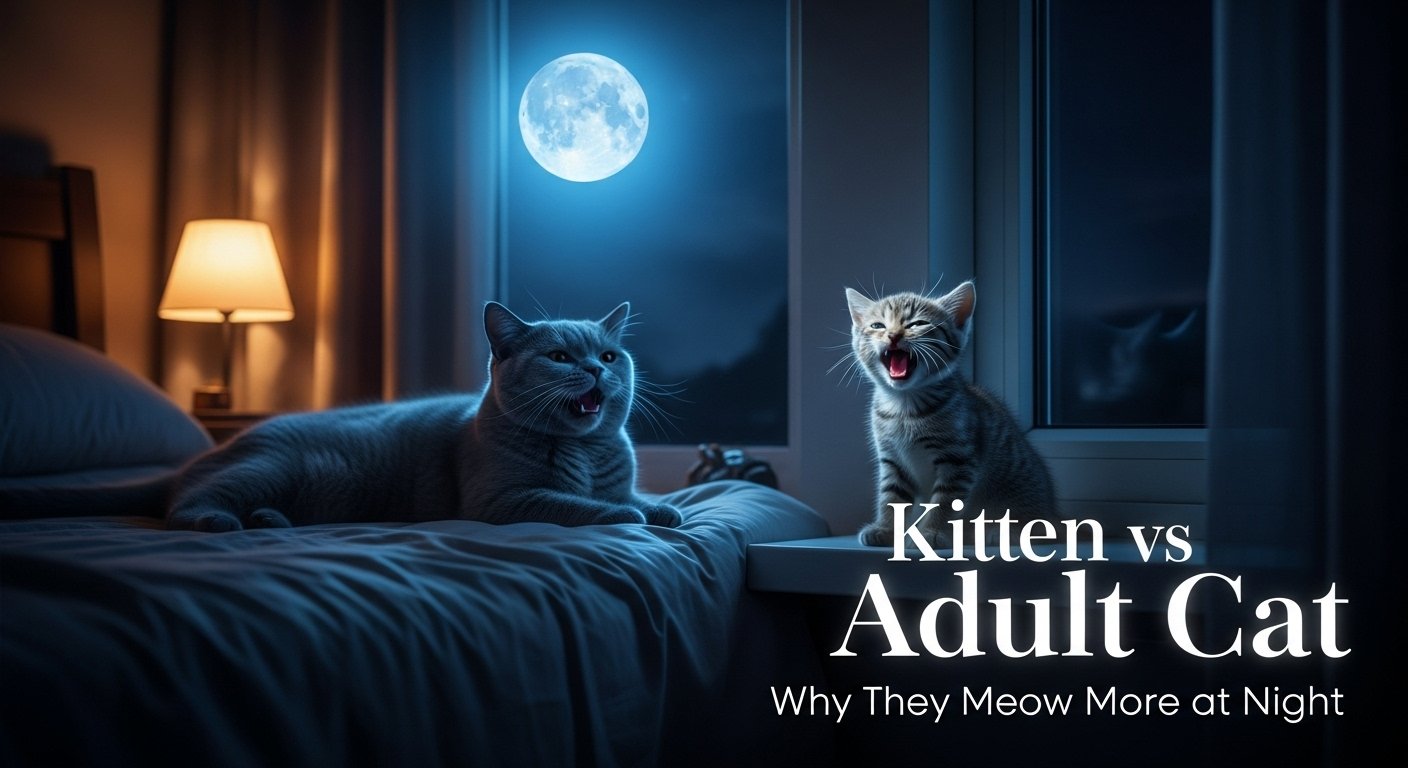
Kitten vs Adult Cat: Why They Meow More at Night
It’s 2 a.m, you’re finally drifting off to sleep, and then… meow, meow, meow! If you’ve ever shared your home with a cat, you’ve likely experienced nighttime vocalizations sometimes playful, sometimes demanding, and often downright confusing.
But here’s the twist: kittens and adult cat’s meow at night for very different reasons. Understanding these differences is the key to solving the mystery and helping both you and your feline get a peaceful night’s rest.
Let’s explore the reasons behind kitten vs adult cat meowing at night and what you can do about it.
Why Cats Are Active at Night
Cats are crepuscular, meaning they’re most active at dawn and dusk. In the wild, this is prime hunting time. Even domesticated cats still carry these instincts, which is why night time (when the house is quiet) often sparks bursts of energy or loud meows.
But the type of meowing and its frequency depends a lot on age.
Why Kittens Meow More at Night
Kittens are still learning how to navigate the world, and their nighttime cries usually reflect their youth, needs, and instincts.
- Separation Anxiety
Kittens recently separated from their mother and littermates may cry out at night because they feel:
- Lonely
- Vulnerable
- Anxious without comfort
This is especially common in kittens under 12 weeks.
- Hunger or Thirst
Kittens have small stomachs and high energy needs. If not fed right before bed, they may wake you up meowing for food.
- Boredom or Playfulness
For kittens, night = playtime. With boundless energy, they may meow to:
- Get your attention
- Invite you to play
- Express frustration if ignored
- Litter Box Needs
Young kittens may still be adjusting to litter training. If their box isn’t clean or if they don’t know where it is they may cry until you guide them.
5.Comfort-Seeking
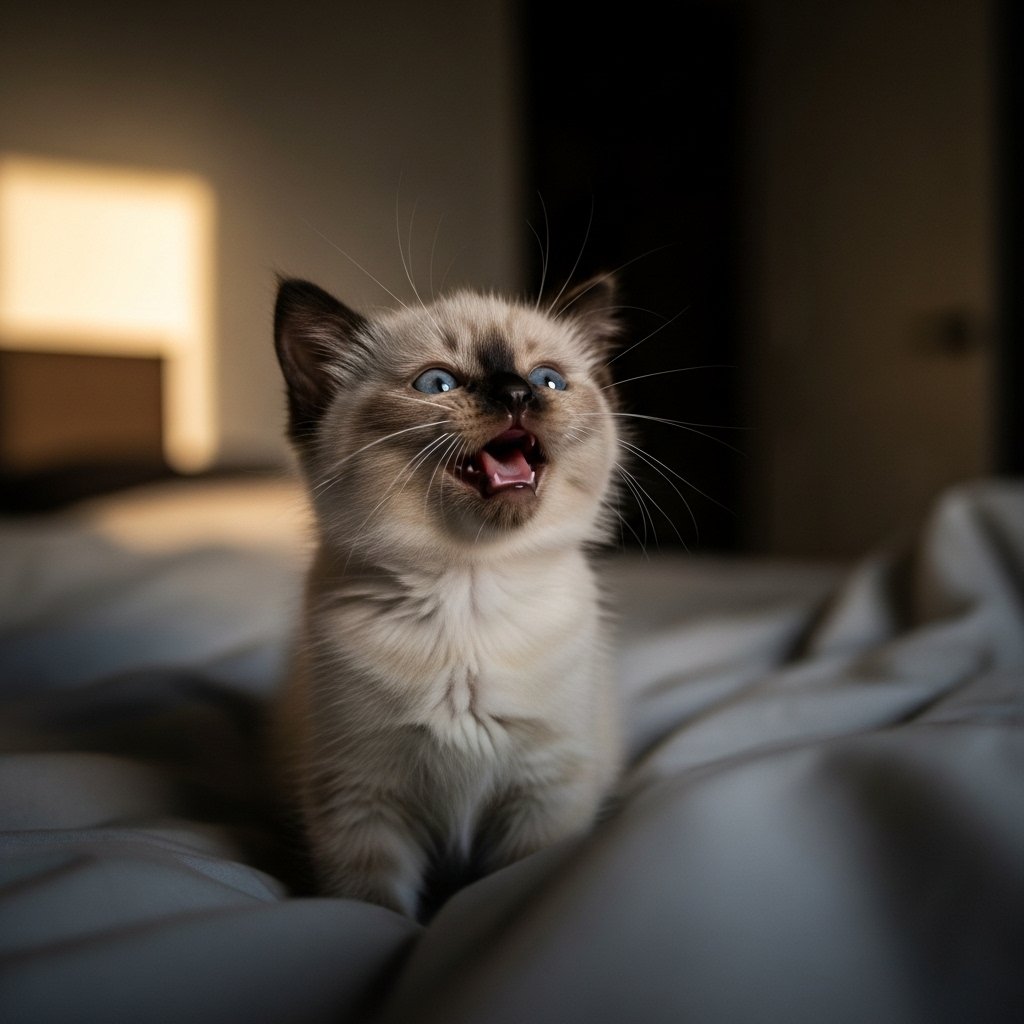
Sometimes kittens simply want warmth and security. They may cry at night because:
- They want to snuggle near you
- They miss their mother’s warmth
- They’re looking for reassurance
Why Adult Cats Meow at Night
- Attention-Seeking Behavior
If your cat has learned that meowing gets you out of bed, they’ll keep doing it. Cats are clever and quickly learn to use their voice to get what they want.
- Hunger Habits
Adult cats often meow at night if they’re used to early morning feedings. Once this becomes routine, they’ll start waking you up for food.
- Territorial Behavior
At night, when it’s quiet, cats may become hyper-aware of:
- Other animals outside
- Strange noises
- New scents
This can trigger nighttime meowing as a way of alerting or protecting territory.
- Stress or Anxiety
Changes in the household new furniture, new people, or even moving apartments can cause nighttime crying.
5.Aging & Cognitive Changes
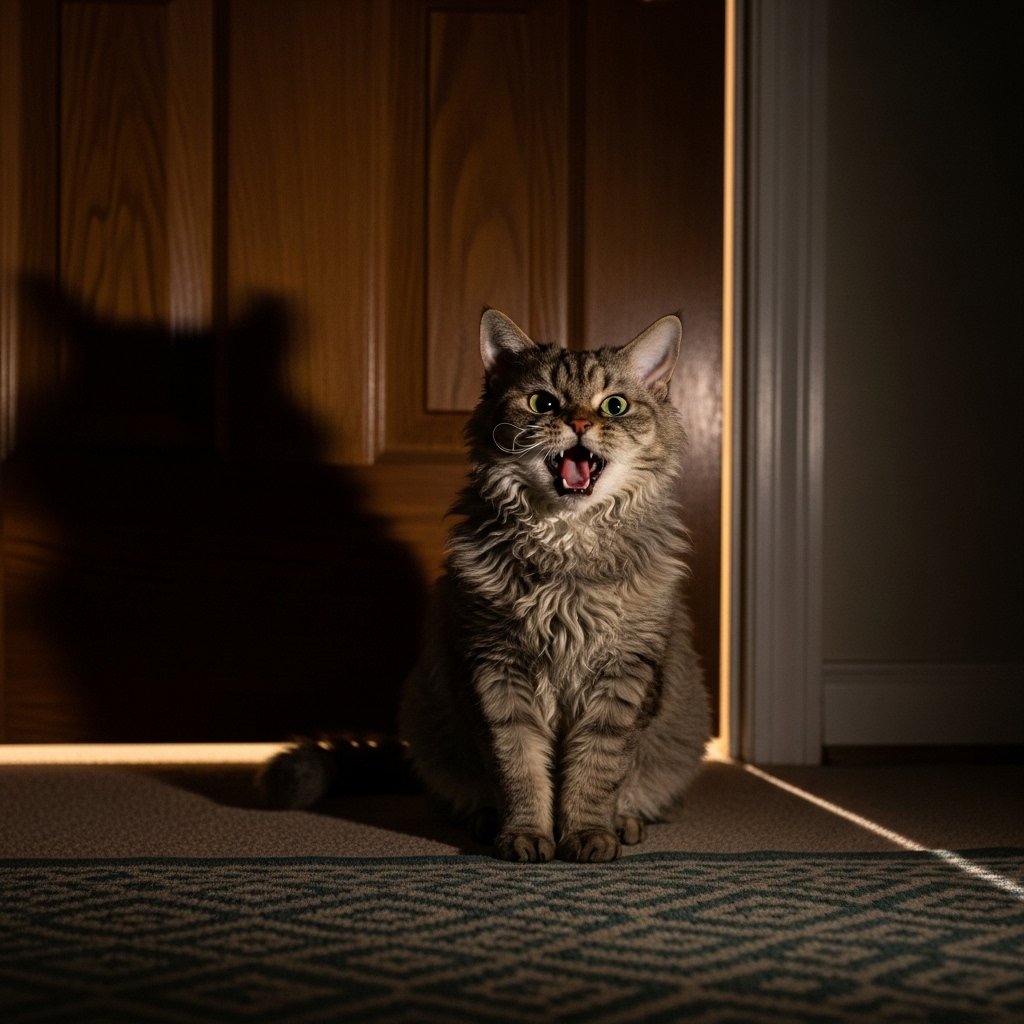
Senior cats often develop cognitive dysfunction syndrome (similar to dementia in humans). Symptoms include:
- Confusion at night
- Wandering
- Excessive meowing
This is often referred to as “night calling” in older cats.
Key Differences: Kitten vs Adult Cat Night Meowing
Factor | Kittens | Adult Cats |
Main Cause | Hunger, comfort, separation anxiety | Attention, routine, territorial issues |
Tone of Meow | High-pitched, frequent, urgent | Lower, repetitive, demanding |
Solution | Extra feedings, warmth, reassurance | Training, routine adjustments, mental stimulation |
Duration | Temporary (as they grow) | Can be long-term if reinforced |
Solutions for Night time Meowing
For Kittens
- Evening Meal: Feed right before bedtime.
- Playtime: Tire them out with 15–20 minutes of active play.
- Comfort Zone: Provide a warm bed, cozy blanket, or safe space.
- Nightlight: A small light helps kittens feel secure.
- Ignore Unnecessary Meowing: Responding every time reinforces the behavior.
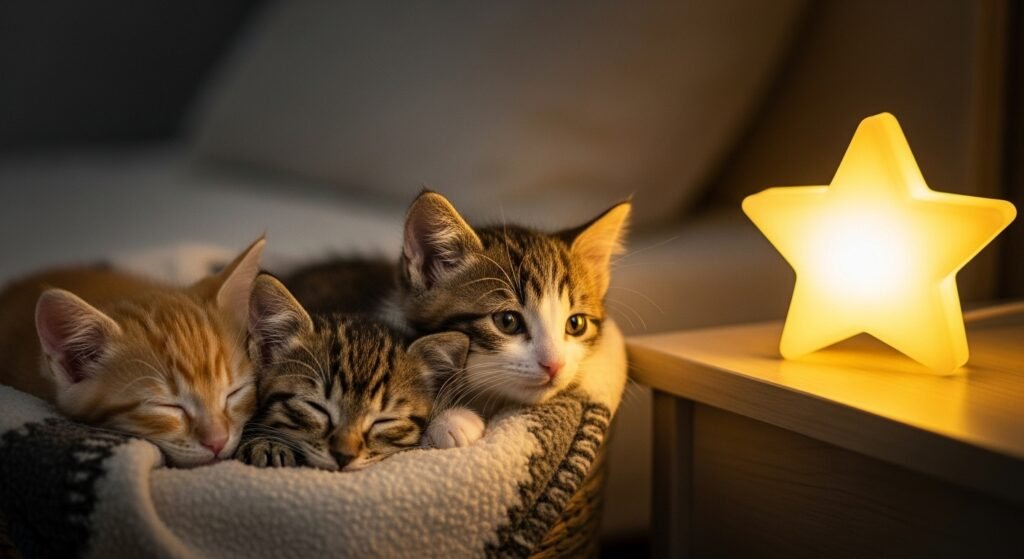
For Adult Cats
- Interactive Play Before Bed: Mimics hunting instincts and burns energy.
- Automatic Feeders: Dispense food early morning so your cat doesn’t wake you.
- Environmental Enrichment: Cat trees, toys, or puzzle feeders keep them occupied.
- Block Outside Distractions: Close blinds or keep them in a quieter room.
- Health Check: If meowing suddenly increases, visit the vet to rule out illness.
- Senior Care: For aging cats with night calling, ask your vet about supplements or calming aids.
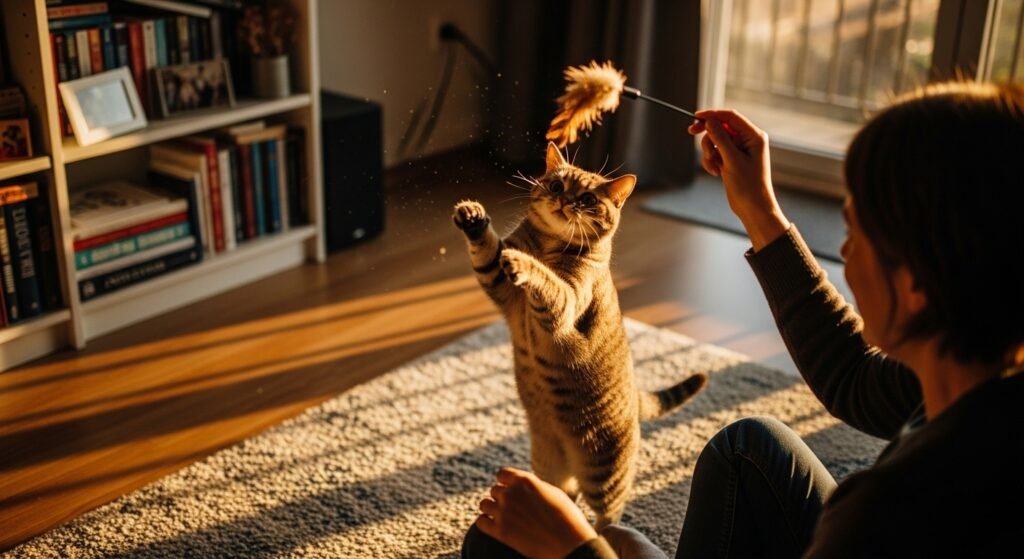
Training Tips
- Don’t Reward Night Meowing: If you give food or attention at 3 a.m., your cat learns to repeat it.
- Consistency Matters: Stick to feeding and play schedules.
- Positive Reinforcement: Reward quiet, calm behavior instead.
- Gradual Ignoring: It may get worse before it gets better (extinction burst), but patience pays off.
Mistakes Cat Parents Make
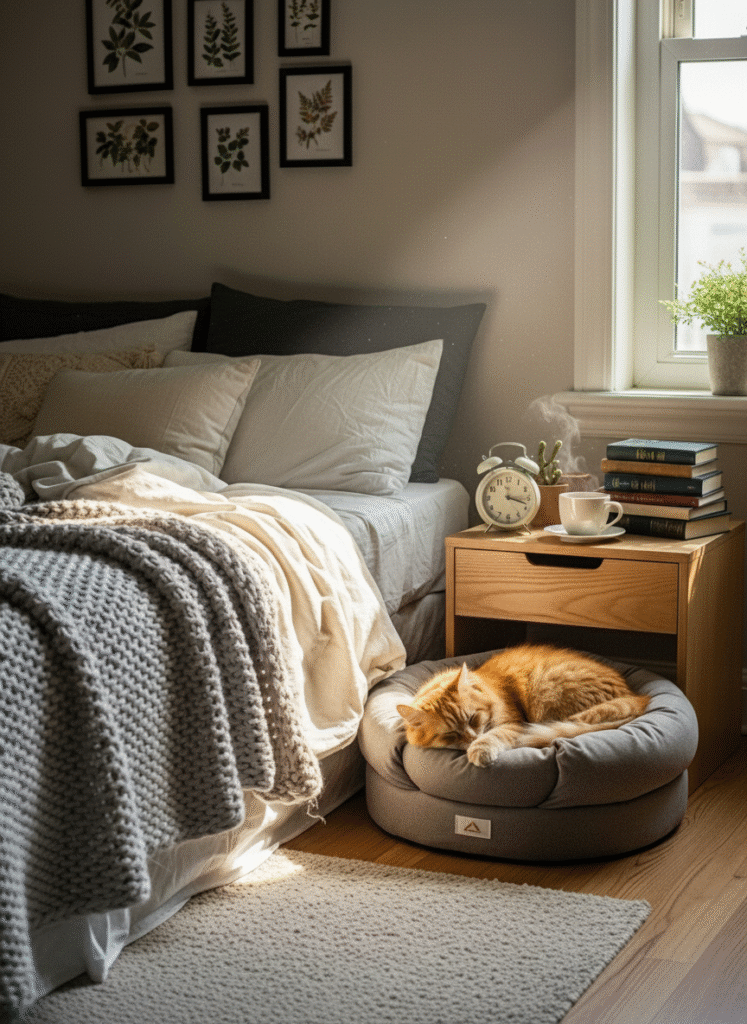
- Feeding Every Time They Cry – reinforces meowing.
- Punishing with Yelling or Sprays – increases stress and worsens the problem.
- Inconsistent Routines – confuses your cat and encourages crying.
- Neglecting Medical Causes – always rule out health issues first.
Final Thoughts
Kittens and adult cats both meow at night but for very different reasons. Kittens cry mostly for comfort and care, while adult cats often meow due to habits, attention-seeking, or health issues.
The key is patience, consistency, and understanding your cat’s unique needs. With the right approach, you can reduce nighttime meowing and help your feline friend (and yourself!) enjoy peaceful nights.
Remember: your cat isn’t trying to annoy you they’re communicating. Once you understand the “why,” you can guide them toward calmer nights.
Ready to Connect?
Enjoyed learning about big dog breeds? Join the Pets Fun Zone community — a growing space for U.S. pet lovers to:
Share photos, stories, and experiences
Ask questions and get advice
Discover recs for food, training, vet care, and more
Join us today at Pets Fun Zone and be part of a caring community of passionate dog lovers!Let’s welcome all the gentle giants together.



